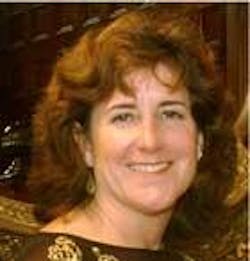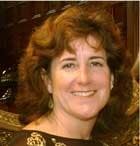A Public Health Leader Heads Up Fones School
by Christine Nathe, RDH, MS
I thought it would be interesting to interview a public health dental hygienist who heads the original school of dental hygiene. Meg Horst Zayan, RDH, MPH, EdD, is the current dean of Fones School of Dental Hygiene in Bridgeport, CT. Fones recently added a graduate degree in dental hygiene and has recently opened a remodeled state-of-the-art dental hygiene clinic.
In addition to her teaching and management experience, Dr. Zayan has worked for the U.S. State Department in Niger, Africa, and as a dental hygienist in the Colorado Migrant Health Department. She continues to teach students about the integral relationship between dental public health and dental hygiene. Not surprisingly, she has received numerous honors including membership in Sigma Phi Alpha, the National Dental Hygiene Society, and Phi Kappa Phi, and has been awarded the Outstanding Teacher Award at Fones School of Dental Hygiene. We recently discussed her career, and here is what she had to say.
Why did you decide to go into dental hygiene?
As a child, I frequently visited the dentist and dental hygienist for routine appointments and restorations. I also experienced extractions of four primary noncarious teeth and four permanent non-carious teeth to prevent crowding and the need for orthodontia.
These experiences allowed me to understand the dental office personnel and the advantages of serving the public and providing education. As I was in the decision-making process to choose a college major, it seemed beneficial to combine health care with education, and I chose dental hygiene. My grandfather always remarked that "a trade and an education will get you far and allow you to be financially stable." His words helped direct me into the dental hygiene profession.
How did you get into dental public health? Did you need additional education?
After graduating with a BS degree in dental hygiene education, I taught for one year. It was during this year that I realized the need for an advanced degree if I wanted to pursue a career in academia. I thought of various options that would provide me with a dental hygiene "specialty" and expand my job opportunities in other venues than academia.
I was not particularly fond of dental public health as a dental hygiene student, but as I became aware of the many opportunities a degree in public health created, I began to read more and ask questions and my interest flourished. As a clinician, I understood what it meant to serve the private sector. I wanted to learn more about serving the public sector.
I was fortunate to have received a scholarship the first year I applied for a master's degree in public health. The curriculum I chose required 18 months of education to earn an MPH. As a minor, I chose health care administration. In retrospect, going into public health was one of the best decisions I made in regard to my education.
What are your current positions?
My current position is dean of Fones School of Dental Hygiene — University of Bridgeport, Bridgeport, CT. Within the Fones School, I also hold the positions of director of graduate studies and associate professor.
Can you discuss any particularly interesting experiences you have had in your dental public health positions?
Two experiences come to mind.
First: I had the opportunity to work a summer in the Colorado Migrant Health Program. This provided me with insight to the benefits of a state-run oral health care initiative. Dental hygienists, dentists, nurses, doctors, and nutritionists collaborated to provide education and health services to the migrant farmers and their children. We were dispersed, by team, throughout the state of Colorado based on need and access. During the summers, these elementary school-aged children attend school while older siblings and parents farm. Our responsibility as dental hygienists was to provide classroom education, screenings, oral prophylaxes, fluoride treatments, and sealants to the children in the schools. If dental work was indicated, we scheduled transportation to local dental offices. During the evenings, we worked in dental offices providing services to the older children and the adults. We all worked together to improve health care and the rewards were outstanding.
Second: Another experience was living in Niger, West Africa, for two years. My husband, as a public health physician, was hired to work in Niger to help in the prevention of blindness and eye diseases. I came on board as a volunteer to help in the treatment of dental disease. Due to the lack of integration of preventive dental hygiene in Niger, my role was small. However, I worked with dentists, assisting them in providing treatment and at times, using my own dental hygiene instruments to remove calculus. Because Niger is a French-speaking country, I was forced to improve my French so that communication when providing education was positive. This experience initiated in me a long-term interest in international dental hygiene.
What type of advice would you give to a practicing hygienist thinking of doing something different?
I would encourage everyone to always consider the various job opportunities we have in the dental hygiene profession. We have chosen a career that in the foreseeable future will always have a public need. I foresee the job opportunities for dental hygienists to increase in number and type. Clinical dental hygiene is the core of who we are. Anyone considering other opportunities will continually utilize their clinical knowledge to maintain and improve oral health care. I encourage dental hygienists to periodically search the various career options available to them. It is not so much that we need to change, but that if we want to change, we can. When a dental hygienist knows the options, she/he will have a greater chance of job satisfaction with the choice she/he makes.
If you have anything else to share, please do. I would like to try to get the message out that there are more opportunities and advancing our educational levels is a good start, etc.
When it comes to a career, the advice given to me years ago was "a trade and an education is what one needs to have a successful career." I strongly believe that dental hygiene is a skill (trade) that along with a college degree will get us far. We are fortunate to have a strong educational base in dental hygiene. As we continue to encourage dental hygienists to pursue bachelor's and master's degrees, we will continue to see more dental hygienists in leadership positions. We have infiltrated ourselves in dental office management, public health, business, sales, research, government, and education. As the recognition of dental hygiene continues to grow, advancing ourselves with further degrees in dental hygiene will influence our roles in the job market.
We chose well when we chose dental hygiene as our profession. Dental hygiene is a viable career that will continue to thrive. As mentioned in Dental Public Health, dental hygiene is the only profession whose theory is based solely on prevention. The emphasis of prevention in health care will be around for a long period of time. We are fortunate to be in the forefront of the prevention movement.
About the Author
Christine Nathe, RDH, MS, is a professor and graduate program director at the University of New Mexico, Division of Dental Hygiene, in Albuquerque, N.M. She is also the author of "Dental Public Health" (www.prenhall.com/nathe), which is in its second edition with Prentice Hall. She can be reached at [email protected] or (505) 272-8147.

